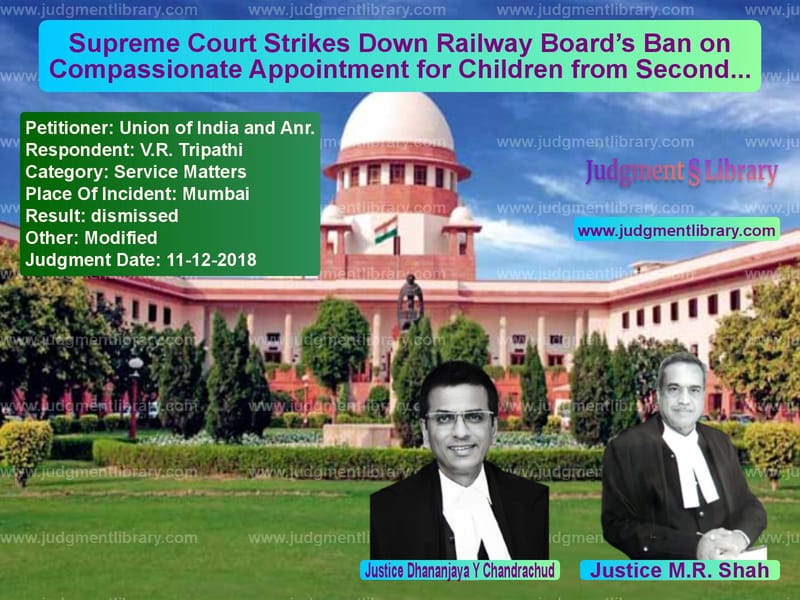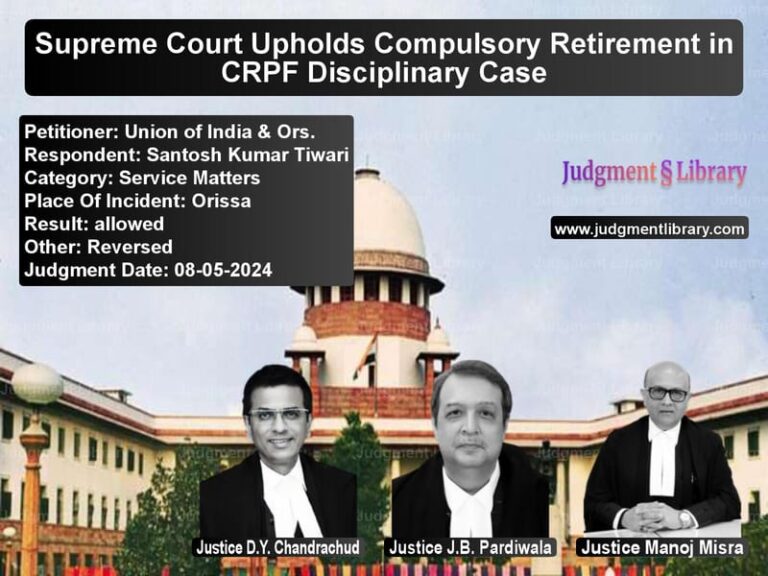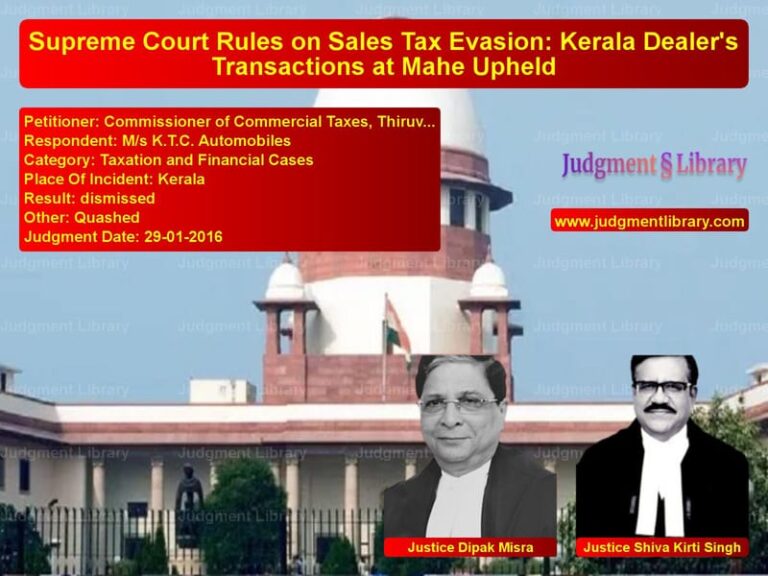Supreme Court Strikes Down Railway Board’s Ban on Compassionate Appointment for Children from Second Marriages
The case of Union of India & Anr. vs. V.R. Tripathi is a landmark judgment addressing the issue of compassionate appointment for children born from a second marriage of a deceased employee. The Supreme Court examined whether denying such appointments based on a policy of discouraging bigamy was legally and constitutionally valid.
The dispute arose when V.R. Tripathi, the son of a deceased railway employee’s second wife, was denied a compassionate appointment on the grounds that his father’s second marriage was not officially permitted. The Railway Board’s circular of 1992 prohibited appointments to children from second marriages unless the marriage was permitted by the railway administration. The Supreme Court ultimately struck down this policy, ruling it as discriminatory and unconstitutional.
Background of the Case
The respondent, V.R. Tripathi, applied for a compassionate appointment after his father, a technician in Central Railways, passed away in 2009. His application was rejected by railway authorities on 6 March 2012, citing the Railway Board’s 1992 circular.
Tripathi challenged the decision before the Central Administrative Tribunal (CAT), which ruled in his favor. The Union of India appealed the ruling in the Bombay High Court, which upheld CAT’s decision. The matter was then escalated to the Supreme Court of India.
Key Legal Issues
The Supreme Court considered the following legal issues:
- Whether the Railway Board’s 1992 circular, which barred children from a second marriage from seeking compassionate appointments, was valid.
- Whether a child born from a second marriage is entitled to employment benefits under Article 14 of the Indian Constitution.
- Whether Section 16 of the Hindu Marriage Act, 1955, which grants legitimacy to children from void marriages, is applicable to compassionate appointments.
Arguments by the Union of India
The Additional Solicitor General representing the Union of India argued:
- Compassionate appointment is an exception to the regular recruitment process and is not a heritable right.
- Such appointments are at the discretion of the government and subject to policy considerations.
- The 1992 Railway Board circular was aimed at discouraging bigamy and ensuring policy uniformity.
- Section 16(3) of the Hindu Marriage Act restricts the rights of children from void marriages only to parental property and does not extend to public employment.
- The state has the authority to limit compassionate appointments only to children from legally valid marriages.
Arguments by the Respondent
The counsel for V.R. Tripathi countered:
- Section 16(1) of the Hindu Marriage Act recognizes children from void marriages as legitimate, ensuring they are not discriminated against.
- Excluding children from a second marriage from compassionate appointment violates the fundamental right to equality under Article 14.
- The Railway Board’s 1992 circular was previously struck down by the Calcutta High Court in Namita Goldar v. Union of India, and the government did not challenge that ruling.
- Once a child is deemed legitimate by law, denying employment benefits on account of the circumstances of their birth is unconstitutional.
Supreme Court’s Judgment
The Supreme Court, led by Justices Dr. D.Y. Chandrachud and M.R. Shah, upheld the Bombay High Court’s ruling and struck down the Railway Board’s policy.
The Court made the following key observations:
- Compassionate appointment is a welfare measure designed to alleviate financial distress following the death of an employee.
- “Once Section 16 of the Hindu Marriage Act recognizes children from void marriages as legitimate, denying them compassionate appointments is arbitrary and unconstitutional.”
- “Children do not choose their parents. To deny them employment benefits despite their legal legitimacy is deeply offensive to constitutional principles.”
- The Railway Board’s justification that the policy was meant to discourage bigamy was flawed because punishing the child for the parent’s marriage was unfair.
- The Court relied on its previous ruling in Rameshwari Devi v. State of Bihar, which upheld pension benefits for children of a void marriage, reinforcing that government employment benefits cannot discriminate against such children.
Key Takeaways from the Judgment
- Legitimacy under the Hindu Marriage Act: A child born from a void marriage is considered legitimate under Section 16(1), entitling them to all legal benefits.
- Unconstitutional Discrimination: Excluding such children from compassionate appointment violates the fundamental right to equality under Article 14.
- Public Employment Not a Heritable Right: While compassionate appointment is not a heritable right, it must still comply with constitutional principles.
- Administrative Circulars Must Comply with the Law: Policies that contradict legislative protections or constitutional rights are unenforceable.
Final Directions
The Supreme Court directed the railway authorities to reconsider V.R. Tripathi’s application for compassionate appointment within three months and ensure compliance with its ruling.
Conclusion
This judgment is a milestone in employment law, reinforcing the principle that children should not suffer discrimination due to circumstances beyond their control. By striking down the Railway Board’s discriminatory policy, the Supreme Court reaffirmed the constitutional mandate of equality and protection of legitimate rights of individuals, ensuring fairness in public employment.
Petitioner Name: Union of India and Anr..Respondent Name: V.R. Tripathi.Judgment By: Justice Dhananjaya Y Chandrachud, Justice M.R. Shah.Place Of Incident: Mumbai.Judgment Date: 11-12-2018.
Don’t miss out on the full details! Download the complete judgment in PDF format below and gain valuable insights instantly!
Download Judgment: Union of India and A vs V.R. Tripathi Supreme Court of India Judgment Dated 11-12-2018.pdf
Direct Downlaod Judgment: Direct downlaod this Judgment
See all petitions in Employment Disputes
See all petitions in Recruitment Policies
See all petitions in Public Sector Employees
See all petitions in Judgment by Dhananjaya Y Chandrachud
See all petitions in Judgment by Mukeshkumar Rasikbhai Shah
See all petitions in dismissed
See all petitions in Modified
See all petitions in supreme court of India judgments December 2018
See all petitions in 2018 judgments
See all posts in Service Matters Category
See all allowed petitions in Service Matters Category
See all Dismissed petitions in Service Matters Category
See all partially allowed petitions in Service Matters Category







